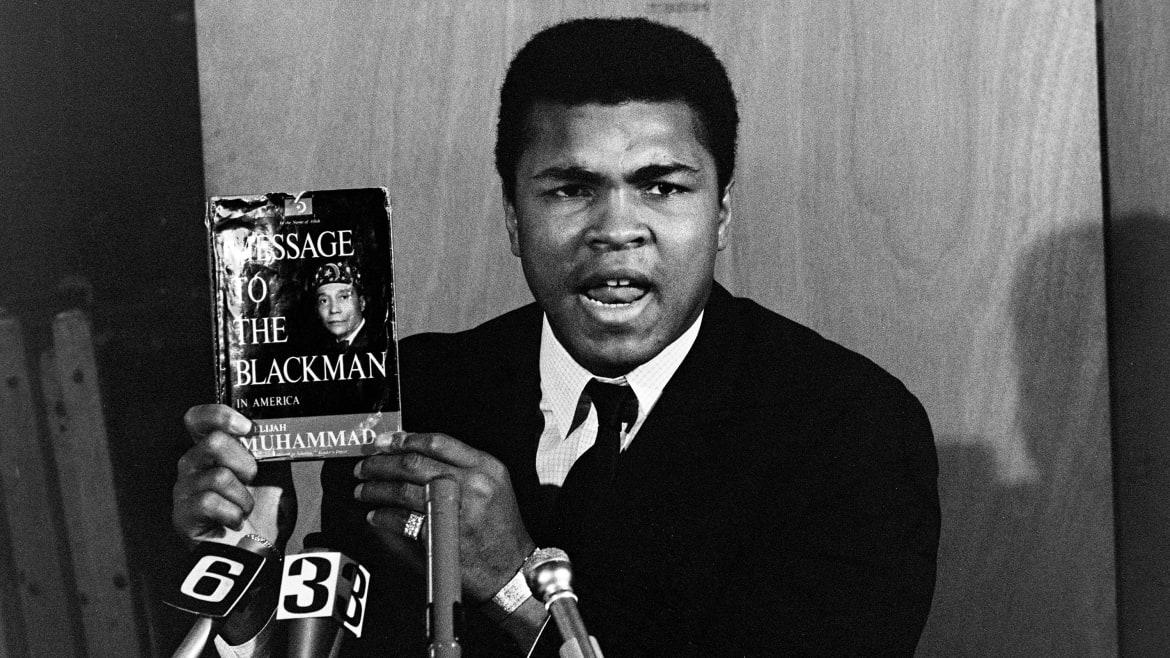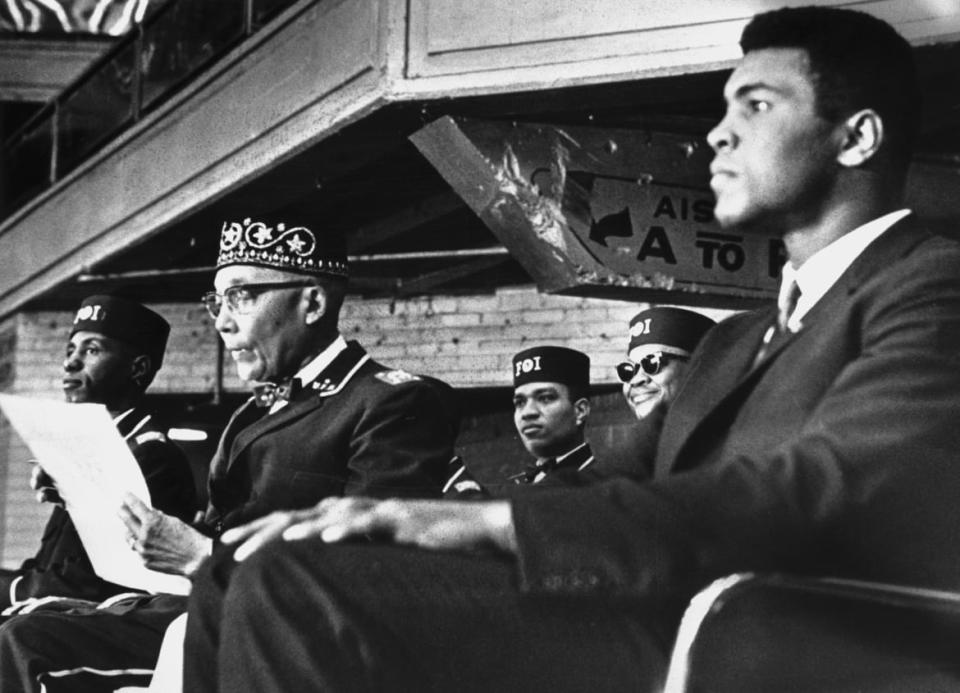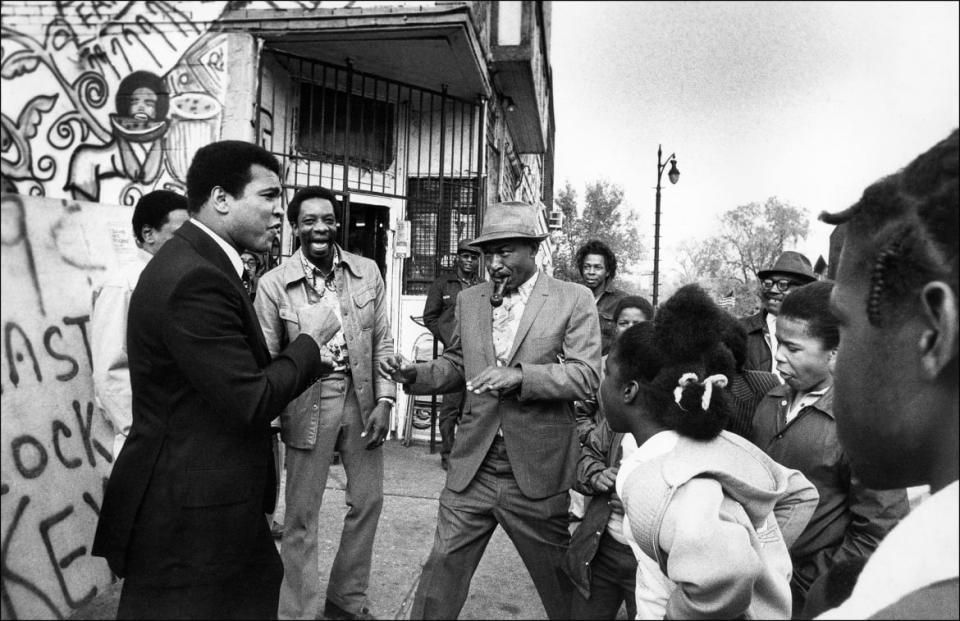What Ken Burns’ Muhammad Ali Doc Misses About the Nation of Islam

- Oops!Something went wrong.Please try again later.
- Oops!Something went wrong.Please try again later.
- Oops!Something went wrong.Please try again later.
- Oops!Something went wrong.Please try again later.
Watching Ken Burns’ new four-part Muhammad Ali documentary stirred my recollections on what the three-time heavyweight champion and the Nation of Islam meant to youths growing up in East Elmhurst, a residential enclave for “Black Muslims” in Queens.
During the 1960s and 1970s, East Elmhurst was home to an assortment of community leaders grappling with the dilemma of racial injustice. Among these were civil rights proponents like Bill Booth, a former judge and chairman of the New York City Human Rights Commission, and NOI figures like Malcolm X, Betty Shabazz and Louis Farrakhan.
The Burns film, Muhammad Ali, did a good job of chronicling the usual markers of Ali’s life story but fell short in depicting why the NOI would appeal to ordinary Black youths at the time; instead, it spotlighted the group’s “separatist” identity, the “exotic” faith and uniforms, the internal rivalries, and the intemperate statements of organization speakers.
I imagine this is to be expected for a mainstream cultural creation that relies on footage from the national press. It’s an approach that is prone to recycle old vantage points like the 1959 CBS documentary on Malcolm X and other “Black supremacists,” The Hate That Hate Produced. To us, though, the Muslims were little more than disaffected Baptists seeking alternative outlets.
The NOI was founded in Detroit in 1930 on the principles of freedom, justice, and equality for people of African descent. By the 1960s, when I became aware of the organization, it had grown to an estimated 70,000 members in the major cities thanks in part to the appeal of charismatic figures like Malcolm X, the national spokesman, and Muhammad Ali.
What the documentary glosses over are the symbols of cultural pride and cooperative ventures that I recall as noteworthy to my peers. For example, the NOI members took steps to let us know that our lives mattered without the slogans and protest marches. It was common to see older men reach out to boys in the parks and on front steps to discuss history, current affairs, and personal goals. What did we want out of life? How do we conduct ourselves as young men? How will we contribute to the community and so forth?
Mike Tyson: Why I’m a Muslim for Donald Trump
They discussed respect for women and family and organized street games like sprints and stick ball. They formed neighborhood watch groups–and one time even retrieved a bicycle that had been stolen by a white passerby. Some narrated the lost history of African civilizations like ancient Sumer and Kush and the medieval empires of Ghana and the Moors. These were things we never heard about from teachers in primary school.
Many of the NOI elders were of modest education. They sometimes got facts wrong or inflated historic achievements–but they tried within limitations to instill confidence in the next generation. Some of us made fun of them for wearing bowties, spouting mumbo-jumbo about the origins of white people, or carrying themselves with the strained dignity of men shunted aside by society. Others of us, though, quietly appreciated the attention of ordinary role models with all their flaws.

"Heavyweight boxing champion Muhammad Ali (R) sits on the podium with Nation of Islam leader Elijah Muhammad while attending the National Meeting of the Black Muslims. Ali drew a standing ovation when he addressed the crowd at the International Amphitheater in Chicago."
Mostly what they espoused were the teachings of the man born as Elijah Poole, a Georgia sharecropper who was an early member of the NOI and became its leader from the 1930s until his death in 1975. He changed his named to Elijah Muhammad and doled out a version of “mother wit” in “Message to the Blackman in America.” The Burns film showed Ali holding a copy of the 1973 work but neglected to explain either the message or its appeal to the ordinary person.
What attracted us was not the message of Islam as much as the message of Black pride, self-improvement, and group cooperation. The NOI promoted survival strategies for marginal populations in the urban centers. It advocated common sense practices like living within your means, saving as much as possible, nurturing a supportive family life, spending your money among yourselves, supporting Black-owned businesses or businesses that hire your people, and seeking to improve health, education and community.
Such teachings gave us a blueprint to improve our chances in life. By contrast, the way of the civil rights programs required an over-reliance on factors outside of our control: protest marches, political coalitions, passage of laws, or begging white people to pay attention to our needs. While some of these things were necessary remedies, they relied so much on the positive responses of white institutions that it could foster a sense of dependency.
The NOI encouraged us to forge alliances across the sizable Black communities in the urban centers and across the Pan-African world. It was a model of communalism that offered a more affirming foundation than the strategy of unceasing rallies and marches–and the NOI practiced what it preached. In the 1960s, the organization instituted an economic program of cooperative development that included the purchase of farms, timberland, home construction, delivery trucks, and businesses owned by individual members and the organization.
In Chicago, for example, it opened 15 different businesses including a clothing factory, supermarket, meat packing company, bakery, restaurant, and barbershop. Across the country, it established grocery stores, dress shops, dry cleaners, bakeries, and restaurants that provided food, cooked meals, and clothing to the Black community at affordable prices. Moreover, it hired and trained people for jobs as managers, clerks, cooks, accountants, carpenters and the like.
Basically, what Elijah Muhammad espoused were adaptations of the economic development program of Booker T. Washington and his National Negro Business League in 1900. Growing up in Georgia, Poole would have observed such initiatives at work in Atlanta and in the business districts of Black communities like Tulsa, Detroit, and Chicago.
The ideas were taken up in Harlem by the Pan-Africanist Marcus Garvey and his Universal Negro Improvement Association in 1914. Elijah Muhammad adapted the idea of cooperative ventures to the NOI, according to Claude Clegg in his 1997 biography, An Original Man. In addition, he witnessed the function of such programs during the Great Depression and of incarcerated Black men running prison services—if they could do it in the joint, he reasoned, why not in their own communities?

"Muhammad Ali enjoying a spontaneous encounter with his fans in Detroit, MI. Circa 1977."
Finally, the film alluded to Ali being exploited by the NOI to finance mosques and other operations. As youths, we had no knowledge of such things, of course. However, the relationship to us seemed more on par with that of a wealthy benefactor to a favored church.
To return to 2021, the African American political class continues to grapple with the dire conditions of their people. For the most part, they have exhausted the prospects for meaningful change through protest—and can no longer stake a primary claim to the “diversity” jobs and programs in government, corporations, and institutions. For that reason, Black leaders should revisit the NOI strategy for economic development that inspired Muhammad Ali.
Get our top stories in your inbox every day. Sign up now!
Daily Beast Membership: Beast Inside goes deeper on the stories that matter to you. Learn more.

